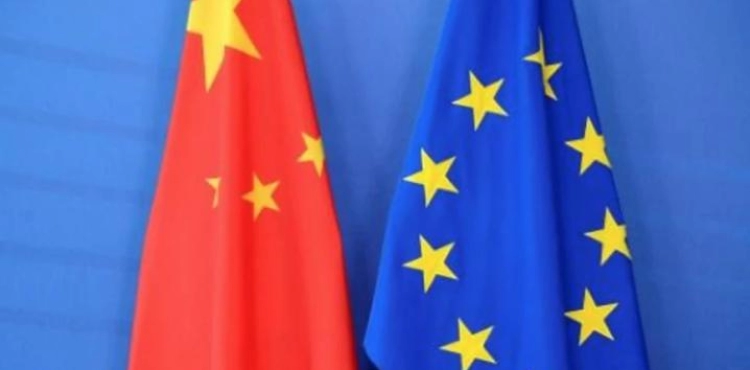The European Union demanded, on Tuesday, China to immediately release citizenship of journalist Zhang Shan, activists from Hong Kong, and a number of imprisoned journalists, lawyers and human rights defenders, following a decision paving the way for an agreement to exchange investment protection with Beijing after progress in negotiations .
On Monday, the 27 member states of the European Union set the stage for a mutual investment protection agreement between the European Union and China, after "progress" in negotiations on Beijing´s commitments to combat forced labor, according to diplomatic sources.
One of these sources said that after the European Commission was informed of the "recent positive developments in negotiations with China, including working conditions," representatives of EU member states at a meeting in Brussels "welcomed this progress widely."
He added that Germany, which holds the rotating presidency of the European Union until the end of December, "indicated at the end of the meeting that no representative waved the red card to stop (the process) and as a result, the way opened for a political green light."
Another diplomat called, however, to be "cautious" pending China´s approval, adding that a formal announcement could be made by the commission in Beijing "by the end of the week."
These negotiations began in November 2013 with the aim of reaching an agreement to mutually protect European investments in China and the Asian giant´s investments in the European Union.
In the wake of this progress, the European Union called on China to release Zhang Shan, human rights defenders and personalities imprisoned in China for disseminating information on "public interest", as well as 12 activists from Hong Kong who were arrested while trying to flee by sea from the former British colony.
A spokesman for the European Union´s Foreign Minister, Josep Borrell, said in a statement that "the continuing restrictions imposed on freedom of expression and on access to information, intimidation and censorship of journalists (...) constitute a source of grave concern," referring to "arrests, trials and penalties against human rights defenders." Lawyers and intellectuals "in China.
Zhang was originally from Shanghai and went to Wuhan, where the new Corona virus was spreading in February. Video reports have been published on social networks, especially related to chaos in hospitals. On Monday, the Chinese judiciary sentenced Zhang, who was arrested in May, to four years in prison after being convicted of "inciting disturbances."
"According to reliable sources, Zhang was subjected to torture and ill-treatment during her detention, and her health seriously deteriorated, and it is imperative that she receive appropriate medical assistance," the European spokesman confirmed.
The European Union also called for the immediate release of lawyer Yu Wensheng, whose sentence of four years in prison was confirmed in mid-December, after a previous ruling was appealed.
It also called for the release of attorneys Li Yuhan and Gao Chicheng, opposition bloggers Huang Qi and Yu Gan, human rights defender Guy Guiping (who was arrested in 2016 during a G20 meeting in China), writer and activist Ken Yongmin, Tibetan language activist Tashi Wangchuck and human rights defender Liu Feiu And Uyghur thinker Ilham Tohti.
Tohti was sentenced to life in prison in China for "separatism", and in 2019 he was awarded the Sakharov Prize for Human Rights awarded by the European Parliament.
The EU-China agreement is supposed to include respecting the intellectual property of European companies, prohibiting forced transfers of technology, and imposing transparency rules on subsidies paid to Chinese public companies.
The official New China Agency reported that Chinese Premier Li Keqiang called his Dutch and Spanish counterparts last week to discuss the talks. The president of the European Chamber of Commerce in China, Jörg Votke, said that these two countries had "objections".
For its part, Paris confirmed on December 23 that it cannot support the agreement unless the communist regime pledges to ratify the International Labor Organization agreements that specifically prohibit forced labor.
Experts and human lefts organizations accuse China of detaining at least one million people from the Muslim Uyghur minority in Xinjiang in "rehabilitation camps," and many of them are subject to forced labor.
A recent US study reported that at least 570,000 Uyghurs were recruited into a forced cotton collection program.
However, the European Commission, which is negotiating, told member states on Monday that it "obtained from China the language that the Europeans requested regarding its compliance with the International Labor Organization´s agreement on forced labor," according to a second diplomatic source.
It was not known whether China´s pledge meant it would actually ratify the agreements anytime soon, or whether it pledged to accelerate its efforts to do so.
The administration of US President-elect Joe Biden views this rapprochement between China and the European Union with concern.
Poland stresses the importance of this point. Polish Ambassador Andrzej Sados expressed his regret for the "sudden and unjustified acceleration" of the timetable "on a very important issue" that "should take into account the relationship with the United States," but he did not express any opposition to the agreement.












